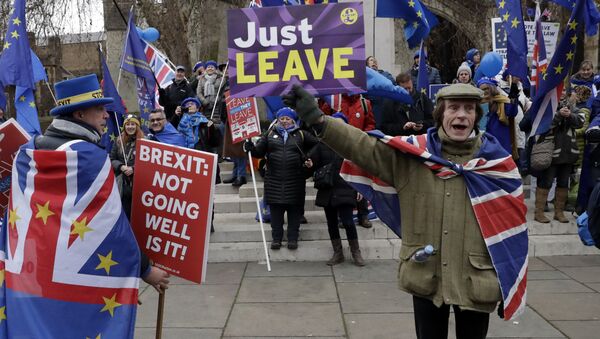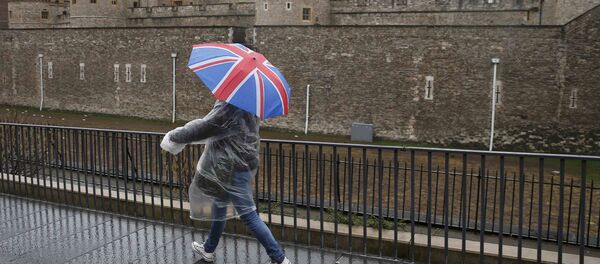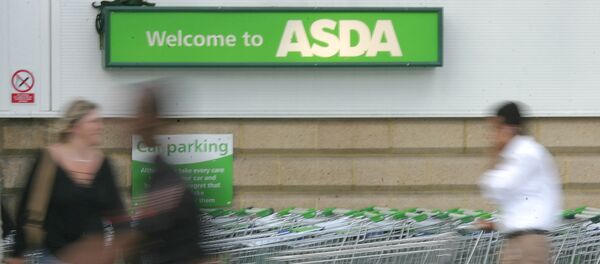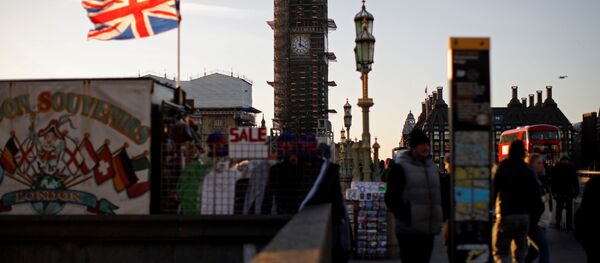Sputnik has discussed this with Donnacha O'Beachain, associate professor at the School of Law and Government, Dublin City University.
Sputnik: Brussels assures London that the backstop will not be in place indefinitely but what actually happens afterwards if the two sides fail to figure out how to avoid a hard border?
Donnacha O'Beachain: Well, in terms of what London is looking for, which is legally binding changes to the withdrawal agreement that will somehow make the backstop a temporary phenomenon, Brussels simply is not willing to provide such a change. It can provide, and this is what Michel Barnier said, it can provide clarifications, it can provide assurances and it can provide expressions of intent, but these are additional to the backstop. They're not a substitute for the backstop. There's no reopening of the withdrawal agreement and, therefore, what we're engaged in now it seems almost a running down of the clock closer and closer to this cliff edge of the 29th of March.
These are prominent Brexiteers, and it's a UK-wide backstop, and that was done at the insistence of the British government. So as I said there's no evidence that the EU intends to open negotiations on this issue. So there's a large sense of theatre about this current process of visiting different capitals, trying to meet different leaders when ultimately the positions aren't fundamentally changing in London, in Dublin, or in Brussels.
Sputnik: Professor, to what extent could the controversy over the border mobilise divisions on the island and undermined the Good Friday agreement?
So this has led in turn to increased calls for a border poll on united Ireland once the Brexit dust has settled, and, of course, it has implications for Scotland as well. There's talk of a second referendum there on independence.
Sputnik: With the Brexit date just around the corner what chances does Theresa May stand to sell her deal to the lawmakers?
Sputnik: What scenario do you think is most likely for March 29? Will the country leave the bloc?
Donnacha O'Beachain: There's a whole range of scenarios that are possible. That's why it's so dramatic and each of them enjoys a certain degree of plausibility. At this stage it looks like an extension might be on the cards, but to have an extension, first, you to have to get the British government to ask for one, that will, of course, annoy influential elements within the Conservative Party who want to be out of the European Union, who want Brexit by the end of this month even if it means jumping off a cliff economically. You'd have to get parliamentary approval for such an extension.
READ MORE: UK Has 'Awful' IT Record: Brexit Chaos Brings Tech Border Issue — Politician
Sputnik: Changing the topics slightly professor, what are the prospects of the UK trade with other nations post-Brexit and, in particular, with the United States? Trade Minister Liam Fox says that he won't except things in trade talks with United States that are against the interests of British consumers…
Donnacha O'Beachain: Well, he may say that, but the question is how can he guarantee that. The prospects are not good to be frank. Negotiations firstly take time and, for example, the EU-Canada agreement took seven years to negotiate. So there's not going to be any instant agreement. These things will take a lot of time, they won't be the next year or two.
And we've already seen that dynamic in British negotiations with the European Union, we will see it again with negotiations with China. So what we're seeing is a rather painful lesson on the fundamentals of global politics and economics that the powerful do what they have the power to do and the weaker have to accept it. And the UK, unfortunately, is leaving a powerful trading bloc to be on its own in the world. And I think one of the tragedies that you will get Brexit, Brexit will happen but it won't be in the form that the British public were led to believe it would come.
READ MORE: Brexit Mess: UK PM Had Habit of Kicking Tough Decisions Into Long Grass — Journo
It certainly won't be as promised. And, indeed, it reminds me of that old, wise saying of that legendary Irishman Oscar Wilde, who said there's only one thing worse in the world than not getting what you want and that is getting what you want. And, indeed, with Brexit there's only one thing worse in the world than not getting Brexit and, as the British electorate will find out, that will be Brexit.
The views expressed in this article are solely those of Donnacha O'Beachain and do not necessarily reflect the official position of Sputnik.







